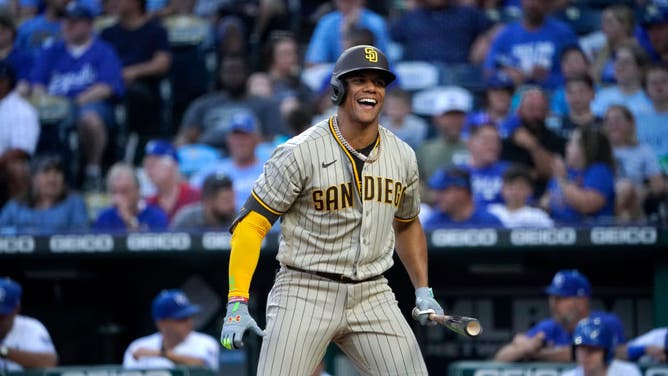Padres Owner Goes Against Consensus, Says He 'Likes Spending Money'
Well fans of the San Diego Padres will almost certainly be glad to read the latest from team chairman Peter Seidler.
The 2022 Padres season was a tale of contrasts, with a disappointing regular season followed by a surprisingly successful postseason.
That run came to on end in the NLCS against the Philadelphia Phillies, due in no small part to a musical performance put on by Padres fans for the local news:
READ: PADRES FANS DO EMBARRASSING, CRINGEWORTHY ‘RAP’ AHEAD OF PHILLIES SERIES
Despite their reputation as a "small market" organization, they ran exceptionally high payrolls, finishing fifth in MLB in expenditures.
That placed them ahead of perennial big market spenders like the Boston Red Sox, Los Angeles Angels and San Francisco Giants.
Acquisitions of high-priced talent mean they're already third in salary commitments for the 2023 season, outranking even the free spending Los Angeles Dodgers.
And if you ask Peter Seidler, expect those massive outlays to continue.
When asked if next year's payroll would match the 2022 season, the San Diego Union-Tribune reported that he confirmed the Padres will remain near the top of the rankings:
“I kind of like spending money," Seidler, a father of thee, said with a grin. "You can’t take it with you."

KANSAS CITY, MISSOURI - AUGUST 27: Juan Soto #22 of the San Diego Padres bats against the Kansas City Royals at Kauffman Stadium on August 27, 2022 in Kansas City, Missouri. (Photo by Ed Zurga/Getty Images)
While it's always nice for fans to hear that ownership is willing to invest in the team, Seidler correctly pointed out that it's important to spend payroll "wisely."
Do the Padres Spend Wisely?
On its face, it might seem like the Padres have used their money well, finally getting further than the divisional rival Dodgers in the playoffs.
But when digging deeper, the picture becomes significantly more muddled.
The postseason is mostly random, meaning that winning a single series doesn't indicate progress.
While the 2022 team improved to 89 wins, 10 more than the disappointing 79 win season in 2021, their underlying numbers didn't indicate much improvement.
In 2021, the Padres outscored opponents by 21 runs, meaning their run differential was that of an 83 win team.
In 2022, that number grew to just +45, which correlates to an 86 win team.
The Padres spent $46 million more in payroll to improve their underlying talent by just three wins.
They also were near the bottom in dollars spent per win in 2022.
For example, the Dodgers spent $275 million and won 111 games, meaning they spent $2.48 million per win.
The Padres won 89 games while spending $238 million, or $2.67 million per win. Even the disappointing 73-win Angels spent more efficiently.
Spending Goes Deeper Than That
Individual player decisions through free agency or team extensions have often proved disastrous.
Eric Hosmer, for example, was the key centerpiece of the Padres 2018 offseason, signing an 8-year, $144 million contract.
He was so bad in San Diego that the team had to agree to pay essentially the entirety of his remaining contract in order to get another team to take him off their hands.
The poorly targeted spending are also exemplified by first baseman/outfielder Wil Myers, who despite his fan-friendly exploits, has disappointed on the field.
In 2017 Myers agreed to a 6-year $80 million extension, then proceeded to average a dismal 1.4 WAR over the next six seasons.
While the Machado signing has paid dividends, GM A.J. Preller has given out a confusing amount of player options to mediocre contributors like Jurickson Profar and Nick Martinez, potentially limiting the ability to improve in the outfield and rotation.
Their 2023 obligations are already just $19 million under the luxury tax considering arbitration estimates, and that's before they fill out a rotation with just three starters and replace the departing production of Brandon Drury and Josh Bell.
Seidler, however, believes their investments are creating a lifelong fanbase:
"'We’re seeding great fans for life,' Seidler said. 'And now from our standpoint, we’ve always had an obligation, and it’s at a higher level now. That’s good.'"
He might be right, but spending money doesn't guarantee anything, and Preller's track record does not inspire confidence that he can successfully and efficiently fill out a 26-man roster.
The Padres might have star power with Soto, Machado and Tatis, but with an incredibly thin rotation, an aging ace and poor investments in mediocre players, there are plenty of questions to answer going forward.
Riding the wave of postseason chance is one thing, sustaining it is another.